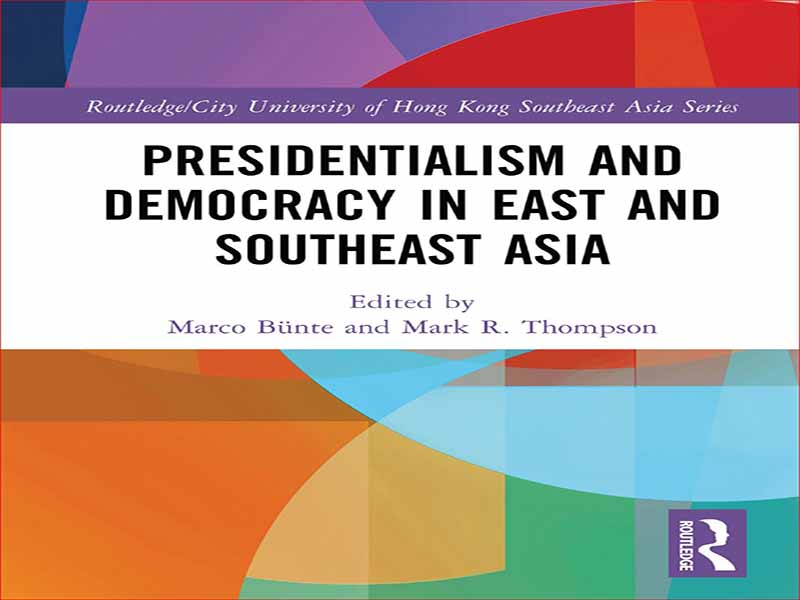- عنوان: Presidentialism and Democracy in East and Southeast Asia
- نویسنده: Marco Bünte and Mark R. Thompson
- حوزه: دموکراسی
- سال انتشار: 2022
- تعداد صفحه: 187
- زبان اصلی: انگلیسی
- نوع فایل: pdf
- حجم فایل: 2.58 مگابایت
بحث در مورد «معاونتهای» ریاستجمهوری (و «فضیلتهای پارلمانتاریسم» فرضی) عمدتاً حول محور مناطق شکل گرفته است. زمانی که خوان جی. لینز بحث در مورد ریاست جمهوری را تجدید کرد، اساساً به فروپاشی دموکراسی در بسیاری از کشورهای آمریکای لاتین در دهه های 1960 و 1970 فکر می کرد. دونالد هوروویتز در نقد لینز با اشاره به اینکه چگونه نهادهای پارلمانی می توانند به بی ثباتی سیاسی در جوامع چند قومی منجر شوند، به شدت از نمونه هایی از کشورهای جنوب صحرای آفریقا استفاده کرد. مطالعات جدیدتر نیز مواردی را از اتحاد جماهیر شوروی سابق آورده است. اما شرق و جنوب شرق آسیا تا حد زیادی در این نبرد نمونه های منطقه ای مورد غفلت قرار گرفته اند. این مایه تاسف است زیرا شش مورد ریاست جمهوری در شرق و جنوب شرقی – اندونزی، میانمار، فیلیپین، کره جنوبی، تایوان و تیمور شرقی (تیمور شرقی) – به الگوی منطقهای بیشتر در این بحث جهانی اشاره میکنند. در حالی که یک مورد آشکار از ریاست جمهوری «خطرناک» (در فیلیپین) وجود دارد، یک مورد واضح از پارلمانتاریسم ناپایدار (در تایلند) نیز وجود دارد. ما استدلال می کنیم که کودتای اخیر در میانمار ارتباط چندانی با ریاست جمهوری ندارد. سیستم های ریاست جمهوری باقی مانده در این منطقه ثابت مانده اند، حتی اگر در برخی موارد (به ویژه اندونزی و به طور فزاینده تیمور لسته، در کنار فیلیپین و البته میانمار)، نشانه های آشکاری از عقب نشینی دموکراتیک وجود داشته باشد. این کتاب سه بحث مختلف را از این منظر منطقه ای پوشش می دهد: خطرناک بودن نسبی ریاست جمهوری، نیمه ریاست جمهوری و تأثیر متقابل ریاست جمهوری با سایر نهادها و همچنین سایر تغییرات در طراحی نهادی در میان «نظام های ریاستی»، و عقب نشینی دموکراتیک در سیستم های ریاست جمهوری. علاقه ما به ریاست جمهوری و پیامدهای آن در این منطقه به سال ها قبل برمی گردد. یکی از ما (تامپسون) مشاور لینز به عنوان دانشجوی دکترا بود و مدتها روی ریاستجمهوری فیلیپین کار کرده است، نمونهای از ریاستجمهوری نسبتاً «خالص». دیگری (بونته) از زمانی که گشایش سیاسی در این کشور کمی بیش از یک دهه پیش آغاز شد، از نزدیک پرونده میانمار (ترکیبی) را دنبال کرده است. تامپسون در هشتمین کنفرانس EUROSEAS 2015 در وین، پانل “ریاست جمهوری گرایی خطرناک در آسیای جنوب شرقی” را به منظور گرد هم آوردن محققانی که در مورد سایر موارد ریاست جمهوری در آسیای جنوب شرقی کار می کنند، تشکیل داد. بسیاری از نویسندگان دیگر در این جلد (Bünte، Feijó، Tomsa، و Ufen) مقالاتی را در آنجا ارائه کردند. از اعضای پانل – که شامل ویلیام کیس و واوان مسعودی نیز بودند – برای ارائههای جالبشان و مخاطبان (شامل تعدادی از محققان برجسته، از جمله مرحوم بندیکت اندرسون) برای سؤالات و نظرات روشنگرانهشان در دو دوره تشکر میکنیم. جلسات پانل بسیار پر جنب و جوش در EUROSEAS.
بونته و تامپسون با همکاری با نویسندگان، ترتیب ارسال این مقالات کنفرانس را به عنوان مقالاتی دادند که به عنوان یک شماره ویژه در مورد ریاست جمهوری در آسیای جنوب شرقی منتشر شد که توسط مجله سیاست معاصر (Bünte and Thompson 2018) منتشر شد. نظرات منتقدان ناشناس و توصیه و حمایت ویراستاران، هلن ای اس. با وجود انبوهی از اوراق.
با تشویق روتلج، سردبیر ارشد مطالعات آسیای جنوب شرقی، دوروتیا شایتر، تصمیم گرفته شد که یک جلد ویرایش شده درباره این موضوع برای سری مطالعات آسیای جنوب شرقی دانشگاه روتلج/شهر هنگ کنگ (ویرایش فدریکو فرارا و تامپسون) پیشنهاد شود. علاوه بر پرونده های آسیای جنوب شرقی، تصمیم بر این شد که دو پرونده مهم آسیای شرقی، کره جنوبی و تایوان اضافه شود تا پوشش منطقه ای و ترکیب پرونده ها افزایش یابد. ما از اریک موبراند (که فصل کره جنوبی را نوشت) و کریستین شفرر (که در مورد تایوان نوشت) به خاطر تمایل آنها برای پیوستن به این پروژه بر اساس تحقیقات گسترده قبلی خود سپاسگزاریم. مایلیم از ویراستاران Contemporary Politics Rosser و Chacko تشکر کنیم که به ما اجازه دادند از نسخه های مقاله موارد کشورهای جنوب شرقی آسیا در شماره ویژه استفاده کنیم. با این حال، تمام مقالات موجود در این جلد به طور کامل بازنگری شده اند، یا حتی به طور کامل بازنویسی شده اند، به ویژه به منظور در نظر گرفتن پیشرفت های جدید. ما معتقدیم که با افزودن نمونههای آسیای شرقی کره جنوبی و تایوان، تضاد قویتری در موارد آشکار میشود، به طوری که این دو مورد جدید نمونههایی از نظامهای نسبتاً قوی ریاست جمهوری هستند که مدتها از ثبات سیاسی برخوردار بوده و نشانههای کمی از عقبگردی دموکراتیک را نشان میدهند.
The debate about the ‘vices’ of presidentialism (and the supposed ‘ virtues of parliamentarism’) has largely evolved around regions. When Juan J. Linz renewed the debate about presidentialism, he was primarily thinking about the breakdown of democracy in many Latin American countries in the 1960s and 1970s. In his critique of Linz pointing to how parliamentary institutions can lead to political instability in multi-ethnic societies, Donald Horowitz drew heavily on examples from sub-Saharan Africa. More recent studies have also brought in cases from the former Soviet Union. But East and Southeast Asia have largely been neglected in this battle of regional examples. This is unfortunate as the six cases of presidentialism in East and Southeast – Indonesia, Myanmar, the Philippines, South Korea, Taiwan and Timor Leste (East Timor) – point to a further regional pattern in this global debate. While there is one apparent case of ‘perilous’ presidentialism (in the Philippines), there is also a clear case of unstable parliamentarism (in Thailand). We argue the recent coup in Myanmar has little to do with presidentialism. The remaining presidential systems in this region have remained stable, even if in some cases (particularly Indonesia and increasingly Timor Leste, alongside the Philippines and of course Myanmar), there are clear signs of democratic backsliding. This book covers three different debates from this regional perspective: the relative perilousness of presidentialism, semi-presidentialism and the interplay of presidentialism with other institutions as well as other variations in institutional design among ‘presidential systems’, and democratic backsliding in presidential systems. Our interest in presidentialism and its consequences in this region goes back many years. One of us (Thompson) was an advisee of Linz as a PhD student and has long worked on the Philippine presidency, an example of relatively ‘pure’ presidentialism. The other (Bünte) has closely followed the Myanmar (hybrid) case since the political opening in the country began a little over a decade ago. Thompson convened the panel ‘perilous presidentialism in Southeast Asia’ at the 8th EUROSEAS Conference 2015 in Vienna in order to bring together scholars working on the other cases of presidentialism in Southeast Asia. Most of the other authors in this volume (Bünte, Feijó, Tomsa, and Ufen) presented papers there. Thanks are due to the panelists – who also included William Case and Wawan Mas’udi – for their interesting presentations and the audience (which included a num-ber of prominent scholars, including the late Benedict Anderson) for their insightful questions and comments during two very lively panel sessions at EUROSEAS.
Working with the authors, Bünte and Thompson arranged for the submis-sion of these conference papers as articles which became a special issue on presidentialism in Southeast Asia published by the journal Contemporary Politics (Bünte and Thompson 2018). Comments by the anonymous review-ers were very helpful as was the advice and support of the editors, Helen E. S. Nesadurai, Mark Beeseon and Jeff Wilson and, later, Andrew Rosser and Priya Chacko, who were instrumental in getting the special issue published relatively quickly despite a large backlog of papers.
Encouraged by Routledge senior editor of South East Asian Studies, Dorothea Schaefter it was then decided to propose an edited volume on the topic for the Routledge/City University of Hong Kong Southeast Asia Studies series (edited by Federico Ferrara and Thompson). In addition to the Southeast Asian cases, it was decided to add two important East Asia cases, South Korea and Taiwan, to enhance regional coverage and the mix of cases. We are grateful to Erik Mobrand (who wrote the chapter on South Korea) and Christian Schaefferer (who wrote about Taiwan) for their will-ingness to join this project based on their own previous extensive research. We would like to thank Contemporary Politics’ editors Rosser and Chacko for allowing us to draw on the article versions of the Southeast Asia country cases in the special issue. That said, all papers included in this volume have been thoroughly revised, or even completely rewritten, particularly in order to take into account new developments. We believe that by adding the East Asian examples of South Korea and Taiwan, a stronger contrast in the cases becomes evident, with these two new cases being examples of rather robust presidential systems that have long enjoyed political stability and show few signs of democratic backsliding.
این کتاب را میتوانید از لینک زیر بصورت رایگان دانلود کنید:
Download: Presidentialism and Democracy in East and Southeast Asia




































نظرات کاربران